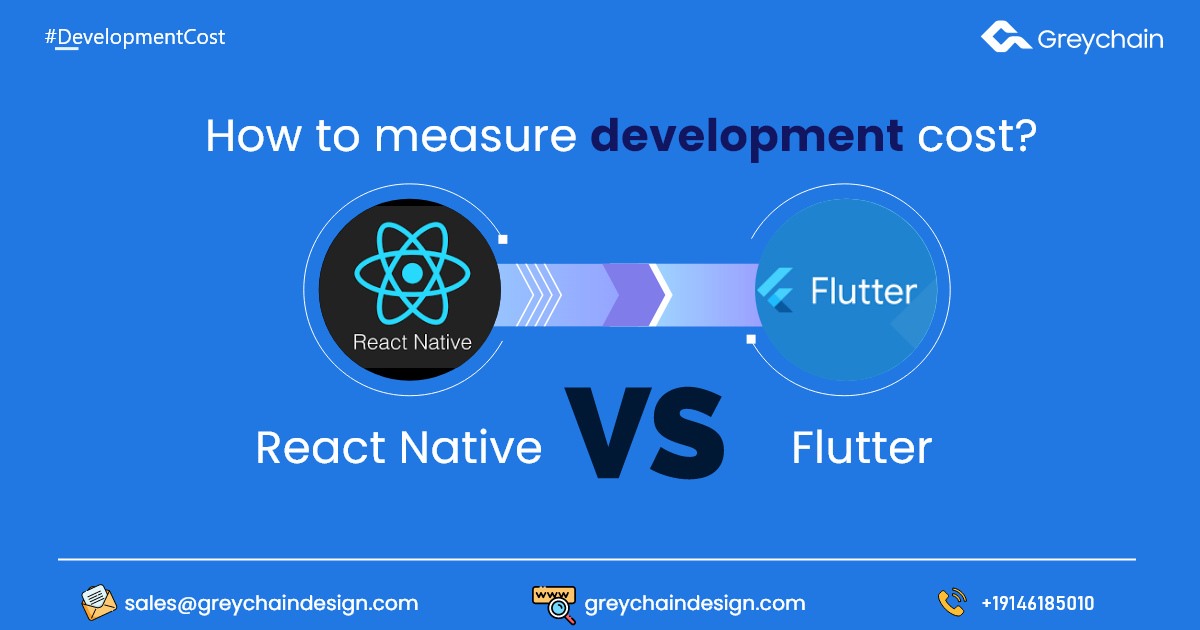Firstly, we would like to thank our readers for showing love to our Flutter vs React Native blog. We received a lot of comments and appreciation for precisely explaining the differences and helping choose the best technology for the emerging developers. So, today we are taking it one step further, and would be discussing the cost of development of both cross-platform technologies.
Let’s get into it!
With the positive mobile app industry growth, we can certainly perceive the need for mobile app development for businesses in 2021. The app development trends facilitate the graph to stay at the top in the coming years. Accordingly, it is imperative to answer the most asked query from the users, “what is the cost of the mobile app development?”
There are different app developments such as data-driven apps, eCommerce apps, gaming apps, on-demand apps etc. Likewise, the cost of development varies to each app type. Besides, the development cost not only depends on “hourly rate x number of hours,” but it also takes several other elements which decide the total cost.
The elements include:
-Expertise
-OS support
-Third-party integration
-Tech stack
-Development team size
-Post launch expenses (updates, license etc.)
-Others
We will not go deep to discuss the traditional app development methods that are generally expensive and a bit outdated.
The modern cross-platform tools are more resilient and enable developers to build apps for multiple OS using single code. Let’s learn about the difference of react native app cost and cost of flutter app development.

[1] Engineering cost:
When we talk about business apps, there are different advanced features that we add to the cart. Features like chat, navigation, map etc. are some of the modern requirements, and that too takes a good amount of development time.
On average, react native app development costs around USD 30k to 50k in the US. Whereas, a flutter mobile app development with basic features costs somewhat between USD 30k to 45k. Besides, the rate increases with the complexity of the mobile app, depending on the features and functionalities.
Yes, the rate also depends on the country of the development company!
[2] Market time:
For any business, mobile app development is an investment to attract more customers towards its products and services. Likewise, the faster your app goes live, the earlier you start getting your returns. Flutter mobile apps come with less development time compared to the React Native technology. It works for various OS using the same codebase (iOS, Android, web etc.). It is a direct development platform with no bridge involvement.
In addition, flutter app builder brings an effective performance boost with less time-to-market. It immensely saves time and money!
On the other hand, React Native apps still use different optimizations which take a bit longer to complete the development process.
*Flutter is the choice if you are looking for quick app development solutions.
[3] Web and Cross-platform support:
As mentioned earlier, Flutter does not require rewriting the codes for different OS and web. Google’s innovation is smart and flexible, and is compatible with both web and cross mobile platforms. Besides, there is no compromise in terms of performance.
Flutter advantage:
Connected PWA
Lavish single-page applications
Inserting dynamic content to existing website
For React Native, it facilitates the existing components to HTML with React DOM. Certainly, it allows the use of the same code to run mobile and web applications, and dispenses mature support.
React Native advantage:
Navigation and styling
Easy to begin
Eminent development
[4] Minimum Viable Product:
Minimum Viable Product or MVP is a business strategy to attract early users with less-featured apps to gain attention. The goal is to spend a little investment and test the business idea, before implementing it full-fledgedly.
Flutter is a reliable resource with different attractive UI designs and features. Moreover, it saves money in buying expensive APIs, and due to hot reload, it minimizes the development time too. Comparatively to the native apps, it takes 50% less testing time. It works constructively in developing MVPs.
In React Native, it can be wisely used as an elementary version of MVP; one can develop the codes in plain JavaScript. Besides, there are several features which we cannot implement in the MVP such as FaceID, sensors, TouchID etc. This may reduce the app’s popularity and lose clients.
[5] Testing and Maintenance:
Flutter comes with well-defined documentation and immense testing features. The company can work on the development and testing phase at the same time, and review the modifications simultaneously. It results in immediate outputs for enterprises, and takes less time. Also, as mentioned above, it takes 50% less testing time.
For React Native, developers use third party systems like Detox and Appium for UI testing. It reduces the testing efforts in most cases and provides effective results. Once a bug occurs, developers need to dig into the existing code, fix it and re-set up the system. It also takes a little extra time for backporting.
[6] Release and launch support:
Flutter’s CLI takes care of the app building and deployment process. By keeping it automated, it allows easy app release on various mobile app platforms. It is an integral process for cross-platform technologies.
For Flutter app development, we need to consider the app size; it takes more space and exhausts extra data bandwidth for download.
For React Native apps, there is no certain CI/CD used for the deployment process. For automation, the technology relies on third-party inventions; plus the release process is labor-intensive and decelerates the system.
Conclusion:
When we talk about the cost differences of Flutter vs React Native, it is intrinsic to understand the different elements that reduce the various time involvements in different development processes. Both advanced frameworks could be used for specific app building. The selection for the best tool matters in terms of project specification.
Nevertheless, many developers have started transiting to the latest Flutter version. It’s nothing untrue to say that Flutter has an upper hand on React Native in 2021; certainly low cost development, flexible and quick development process.
If you are still left to check our popular Flutter vs React Native blog, please do read it using the link below:
Why choose Flutter cross-platform over React Native in 2021?
Looking for reliable web and mobile app development services?
Grey Chain Technology is an international app development solution assisting businesses, nonprofits and individuals all over the world. We provide a diverse range of mobile app development solutions such as:
- Native app development
- Flutter app development
- Android app development
- iOS app development
- DevOps
We can certainly assist you with your custom mobile app development; you are just a call away to connect with our experts.
Give us a call at +1 (914)618-5010(US), +919667665464 (IND) or send us your requirements via email at sales@gcdev.greychaindesign.com.

